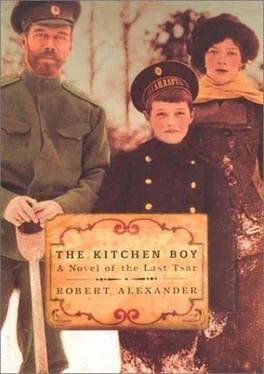Avdeyev looked in Nikolashka’s direction, and muttered, “ S’yad !” Sit!
“But-”
“Sit down and be quiet!”
Good soldier that he was, the Tsar sank back down, and all of us watched in terror as this group of thugs moved from the drawing room, into the dining room, and then proceeded into the bedchambers. Maria Nikolaevna and I, peering through the open doorways, watched and tried to discern what they were saying, but of course it was impossible. Their voices were low and deep, a lot of grumbling went on. For what purpose had they come? I looked over at the Tsaritsa, who was clutching the Tsar’s hand, her eyes clenched shut in fright. Would they search the rooms, tear apart their things in search of evidence against them? Might the “medicines” be discovered?
But then… then…
The group of men was going from one whitewashed window to the next, and I whispered to Maria, “It looks like they’re checking out which windows can be opened.”
“They must be from the regional soviet.”
And so it became evident that they were in fact a soviet – a council, a committee – that had been formed to decide which, if any, windows might be unglued. For more than twenty minutes these Reds went from room to room, from window to window, discussing all this with the utmost intensity. They must have been terribly afraid of anarchists or conspirators – that is, worried that one group might take a shot at the Tsar through that open window, or fearful that another bunch might try to rescue their monarch via an opening. Finally, in the end they seemed to agree not to agree. Perhaps they had a report to make. Perhaps they were afraid of answering with their lives. In any case, this group of six men emerged from the bedchambers, staring at the Imperial Family as if they were circus freaks.
As they headed out, Nikolai Aleksandrovich rose again to his feet, pleading yet once more, “We would be most obliged for a single window to be opened. You can see for yourselves not only how hot it is in here, but how unhealthy it is. Please, I ask you to consider the health of my wife and children, all of whom are suffering.”
Komendant Avdeyev glared at his Nikolashka.
And the Tsar continued, saying, “On another matter, we would also be happy to be given any work. For example, we would appreciate the opportunity to clear the garden in the rear, which is quite a mess. I myself would greatly like to saw more wood – to cut and stack it.”
“At this point, nothing of that sort is permitted,” snapped Avdeyev as he and the others departed.
Depressed, forlorn, the Romanovs melted back into the heat, which could only be described as colossal. The family sipped at their tea and nibbled at the bread, which only minutes earlier had provided such joy, such pride, but was now only so much of nothing. After a few minutes Nikolai Aleksandrovich began to read aloud to his son, while Aleksandra Fyodorovna took out some cards and began to lay patience. Two of the girls played dominoes, but of course not for money, which Aleksandra, with her grandmother’s tight Victorian morals, would never allow.
Very little happened during the rest of the day, at least not until Vladimir Nikolaevich – Dr. Derevenko – came to check on the health of the Heir. By that time of day, nearly six, I was back in the kitchen helping Kharitonov with the preparations for the meager dinner that would be served at eight. Cutlets and leftover macaroni tart. It was Demidova herself, her face forlorn, who came into the kitchen.
“Vladimir Nikolaevich has arrived.” She tried not to say it, but could not restrain herself from whispering, “ Neechevo .” Nothing.
So there was no news, no reply to our reply. Sure, even the Tsaritsa’s maid knew we were awaiting more news from the outside, for that was how the Tsar and Tsaritsa handled this. No one was excluded, which was very democratic of them.
“Leonka, the doctor requests hot water,” said Demidova.
“Da-s,” I replied.
A few minutes later, bearing a bowl of hot water, I walked into the bedchamber and found not just the doctor, but also Komendant Avdeyev himself seated at the foot of the Heir’s bed.
“Ah, thank you, Leonka,” said Vladimir Nikolaevich.
The doctor, who’d been using his special device to electrify Aleksei’s knee – and thereby stimulate circulation – placed the mechanism and tangle of wires aside. He then beckoned me forward.
“Come here, boy.”
And so I stepped toward him and held the bowl as he dipped in a cloth and wrung it out. For the next ten minutes, I didn’t move as the doctor applied warm compresses to the boy’s left arm. And during that entire time, Avdeyev just sat there, yawning, scratching his nose, not doing anything but making it impossible for the Emperor or Empress to pose a single question to Derevenko. Most disturbing, though, was that the doctor simply went about his usual business without any pretense that he knew something was going on. Not one of us spoke during his treatment of the Heir, and fifteen minutes later Vladimir Nikolaevich simply packed up his medical kit and departed without so much as raising an eyebrow. Or our hopes, for that matter.
Shortly before dinner the girls washed their parents’ pocket handkerchiefs. And later, after dinner, all of us gathered in the drawing room and listened to Nikolai Aleksandrovich read aloud. The heat and the lack of air continued to be intense, and I went to bed soon after Aleksei Nikolaevich. Sometime toward midnight a huge storm came upon us, the wind ferocious, the rain strong. The first crashes of lightning and thunder woke me, and then I lay awake for a long time, listening to the heavy drops beat against the metal roof of The House of Special Purpose.
Thus ended our first long day of waiting, which seemed extraordinarily calm in comparison to the next.
June 23, 1918, started out to be a lovely day. A Sunday it was, and the heavy rains of the night had washed away the heat. Weeks earlier the Bolsheviki had painted the thermometer with lime as well, but even they realized the cruelty – not to mention the senselessness – of depriving the Romanovs their only divertissement. That little glass thermometer that hung outside the girls’ room was the family’s only contact with the outer world, the only vehicle of news from their lost beyond. And so after much protest from Nikolai Aleksandrovich, the whitewash was scratched from a tiny corner of the window pane and from the thermometer itself, and in this way were we able to note the dramatic moods of the Siberian day. Without fail, master and servant alike followed the fluctuating mercury with the utmost interest. One of the girls would pause in her reading, jump off her bed, check the measuring device. The Emperor would slow in his pacing of the rooms, bend over, see what God had decided for the day. Demidova would steal a glance as she straightened things. Even the guards posted inside found it a welcome distraction.
When the household awoke for the new day, it was thirteen degrees of warmth on the street. Inside it was nearly as cool, for the powerful winds of the night had not only swayed the trees, but poured through every crack of the Ipatiev House. For the first time in days the stale air had been forced away, and in the rooms it was pleasant, refreshing, almost delightful. It gave us hope, truly it did, and early that morning Aleksandra Fyodorovna sat in bed writing to the mother of a wounded soldier about how one shouldn’t lose faith, that God would bring better days. Yes, sure, her belief in the Almighty gave her remarkable inner strength, and she often said, “Don’t worry. The deadly illness must be borne, then the organism becomes stronger and life becomes easier and lighter.”
Читать дальше












